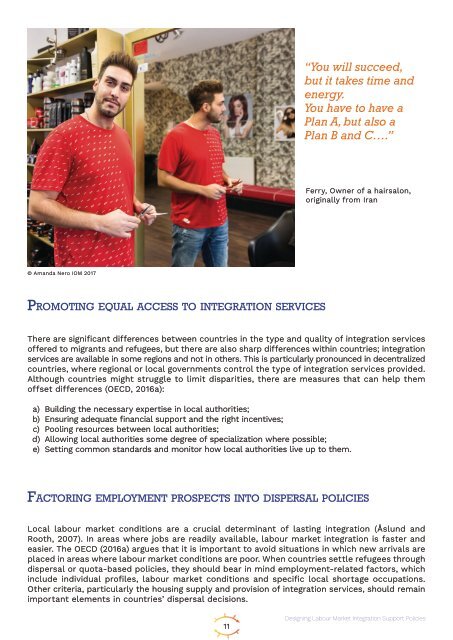Guidelines S2W 2018
You also want an ePaper? Increase the reach of your titles
YUMPU automatically turns print PDFs into web optimized ePapers that Google loves.
“You will succeed,<br />
but it takes time and<br />
energy.<br />
You have to have a<br />
Plan A, but also a<br />
Plan B and C….”<br />
Ferry, Owner of a hairsalon,<br />
originally from Iran<br />
© Amanda Nero IOM 2017<br />
Promoting equal access to integration services<br />
There are significant differences between countries in the type and quality of integration services<br />
offered to migrants and refugees, but there are also sharp differences within countries; integration<br />
services are available in some regions and not in others. This is particularly pronounced in decentralized<br />
countries, where regional or local governments control the type of integration services provided.<br />
Although countries might struggle to limit disparities, there are measures that can help them<br />
offset differences (OECD, 2016a):<br />
a) Building the necessary expertise in local authorities;<br />
b) Ensuring adequate financial support and the right incentives;<br />
c) Pooling resources between local authorities;<br />
d) Allowing local authorities some degree of specialization where possible;<br />
e) Setting common standards and monitor how local authorities live up to them.<br />
Factoring employment prospects into dispersal policies<br />
Local labour market conditions are a crucial determinant of lasting integration (Åslund and<br />
Rooth, 2007). In areas where jobs are readily available, labour market integration is faster and<br />
easier. The OECD (2016a) argues that it is important to avoid situations in which new arrivals are<br />
placed in areas where labour market conditions are poor. When countries settle refugees through<br />
dispersal or quota-based policies, they should bear in mind employment-related factors, which<br />
include individual profiles, labour market conditions and specific local shortage occupations.<br />
Other criteria, particularly the housing supply and provision of integration services, should remain<br />
important elements in countries’ dispersal decisions.<br />
11<br />
Designing Labour Market Integration Support Policies



